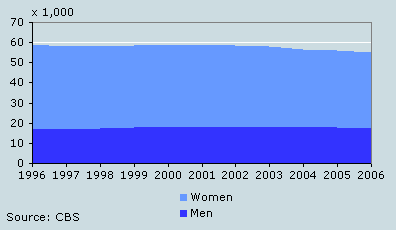Widowhood hits women harder than men

After losing one’s partner, disposable household income declines. The loss of income is more substantial for women than for men. Generally, purchasing power is not affected after loss of the partner, because fewer people have to live on the reduced income. Calculations over the period 2001–2003 show that women who are widowed before the age of 65 face marginal loss of purchasing power.
Annually 55 thousand people lose their partners
Every year, some 55 thousand married persons lose their partners. Most surviving spouses are women, as the male marriage partner is usually older and female life expectancy is higher. Last year, 38 thousand women were widowed as opposed to 17 thousand men; 11 thousand out of the 38 thousand widowed women were under the age of 65.
Surviving partners by gender

Financial consequences more dramatic for widows
On average, people who lost their partners faced a 25 percent cut in disposable household income. Women − and women under the age of 65 in particular − were hit harder than men. Young widowers saw their disposable incomes decline by 13 percent, young widows by 27 percent. Young widows also lost more than 2 percent of their purchasing power.
Change in disposable household income after loss of partner, 2001/2003

Women under 65 often depend on Anw benefit
As many younger women have no income of their own, the financial consequences of losing their partners are more severe for them than for younger men. Widowed women more often than their male counterparts depend on the General Survivors Pension Act (Anw). For older women, pension was and remains the main source of income. Older women faced income cuts of more than 25 percent, while their purchasing power remained intact.
Main income source of women under 65, before and after loss of husband, 2001/2003

No loss of purchasing power for men
The disposable income of widowers was not affected so drastically, because their deceased partners had only a small income or no income at all. Because the number of persons who previously shared the household income was reduced, their income situation even improved.
Jan-Willem Bruggink, Saskia te Riele and Jan Latten